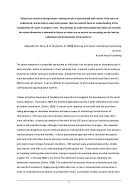Why have struggles over the nature and scope of welfare provision become such endemic features of contemporary societies?
Why have struggles over the nature and scope of welfare provision become such endemic features of contemporary societies? Today the welfare state today is a focal point of intense political controversy. A number of forces have come together to question its viability, efficacy and utility. These forces include the ageing of the population, high levels of unemployment, soaring budget deficits, ascendancy of market forces, privatisation of economic and social activities, and accelerated globalisation and technological change. This essay will look at the different types of welfare provision and the associated struggles over their nature and scope. I will account for the rise of the welfare state and explain how the idea of social rights leads many to expect a certain level of welfare provision. I will conclude with an assessment of what the future is likely to hold for the welfare state. In order to look at the issues facing welfare provision today, we need to know exactly what we mean by a welfare state. A welfare state involves state responsibility for securing some basic modicum of welfare for its citizens. The basic premise of a welfare state is that the government has the responsibility for the well being of its citizens and that this cannot be entrusted to the individual. In Britain, the rise of the welfare state came about particularly after WW2, which was centred on


















